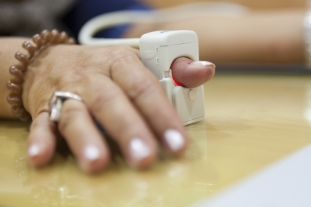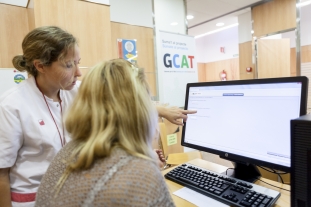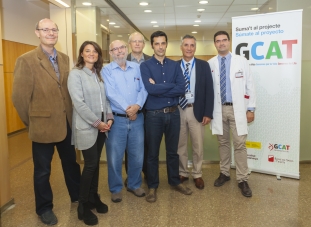Wednesday, 21 October 2015
GCAT is presented at The Biomedical Research Campus at Can Ruti
The GCAT Project is fully underway with the second phase about to start
Today the GCAT project was presented in public at the blood donor centre in the Hospital Germans Trias on the Can Ruti Campus
Attending the event from the GCAT were Manuel Perucho, PhD, Director of the IMPCP and Director of the GCAT accompanied by Rafael de Cid, PhD, Scientific Director and Principal Investigator of the project. They were accompanied by Víctor Moreno, MD, PhD, Epidemiologist and co-Principal Investigator on the GCAT, and Head of the Biomarkers and Susceptibility Unit at the Catalan Institute of Oncology (ICO). From the Blood and Tissue Bank (BST) Lluís Puig, MD, PhD, Director of Healthcare was present as the person responsible for recruitment of participants. He was joined by Dr Joan R Grifols, MD, Director of the Can Ruti Blood Donors Centre. Dr Manel Puig, MD, PhD Scientific Director of the Germans Trias Institute, umbrella organization for biomedical research on the campus, completed the team.
The GCAT laboratories and the pipeline for samples and data input are functioning smoothly with data from 7,469 participants already in the database. The next stage is about to start with genomic variation analysis of 5,000 samples to map genomic variation for the two million known genetic variants. This will be followed by sequencing of 1,000 genomes to produce a whole map of genome variation.
What marks the project as different is the sampling of apparently healthy individuals and their subsequent follow-up over 20 years.
"Although many groups of patients have been studied this is the first project to sequence the genomes of such a large sample of the general population in Spain," commented Dr Perucho.
" It is now recognized that genomic profiling of a large group of individuals and linking this data to their medical records is the way forward as regards a more precise, if you like 'personalized' way of practising medicine." Explained Dr de Cid. "Indeed, there are many projects worldwide looking at different populations and looking at these samples together and using a unified methodology, which is what is taking place in Europe now, this will produce a wealth of results. We don't know what all of the discoveries will be yet, but as the technology improves and the prices of analyses drop continually the range of what we can do will expand along with our possibilities of finding the causes of the common diseases that most of us develop at some point."
"We are all looking forward to these results coming in over the years and pushing the benefit of this knowledge forwards from basic research to clinical practice," added Dr Perucho.
Related Links







